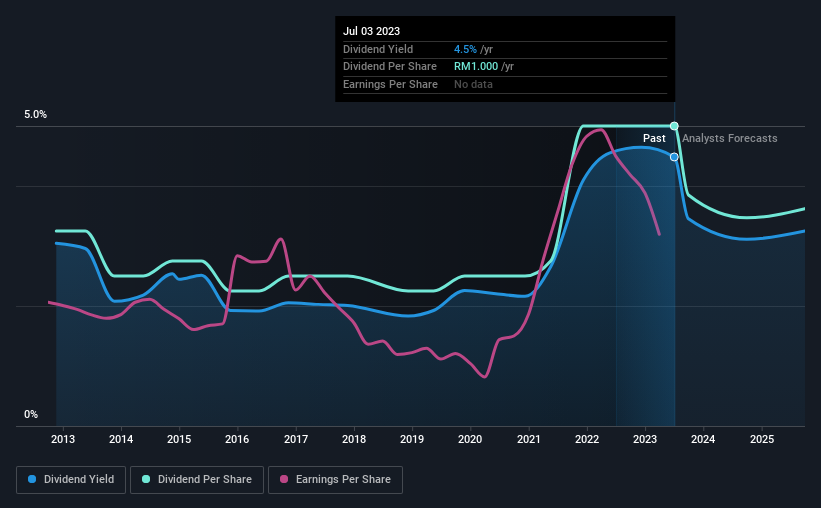Kuala Lumpur Kepong Berhad (KLSE:KLK) Is Paying Out A Dividend Of MYR0.20

The board of Kuala Lumpur Kepong Berhad (KLSE:KLK) has announced that it will pay a dividend of MYR0.20 per share on the 1st of August. This payment means that the dividend yield will be 4.5%, which is around the industry average.
See our latest analysis for Kuala Lumpur Kepong Berhad
Kuala Lumpur Kepong Berhad's Dividend Is Well Covered By Earnings
While it is always good to see a solid dividend yield, we should also consider whether the payment is feasible. The last dividend was quite easily covered by Kuala Lumpur Kepong Berhad's earnings. This indicates that a lot of the earnings are being reinvested into the business, with the aim of fueling growth.
EPS is set to fall by 11.8% over the next 12 months. However, if the dividend continues along recent trends, we estimate the payout ratio could reach 78%, meaning that most of the company's earnings are being paid out to shareholders.

Dividend Volatility
The company has a long dividend track record, but it doesn't look great with cuts in the past. The dividend has gone from an annual total of MYR0.65 in 2013 to the most recent total annual payment of MYR1.00. This means that it has been growing its distributions at 4.4% per annum over that time. It's encouraging to see some dividend growth, but the dividend has been cut at least once, and the size of the cut would eliminate most of the growth anyway, which makes this less attractive as an income investment.
The Dividend Looks Likely To Grow
Growing earnings per share could be a mitigating factor when considering the past fluctuations in the dividend. Kuala Lumpur Kepong Berhad has impressed us by growing EPS at 19% per year over the past five years. Since earnings per share is growing at an acceptable rate, and the payout policy is balanced, we think the company is positioning itself well to grow earnings and dividends in the future.
Kuala Lumpur Kepong Berhad Looks Like A Great Dividend Stock
Overall, we think that this is a great income investment, and we think that maintaining the dividend this year may have been a conservative choice. The distributions are easily covered by earnings, and there is plenty of cash being generated as well. If earnings do fall over the next 12 months, the dividend could be buffeted a little bit, but we don't think it should cause too much of a problem in the long term. All of these factors considered, we think this has solid potential as a dividend stock.
Market movements attest to how highly valued a consistent dividend policy is compared to one which is more unpredictable. At the same time, there are other factors our readers should be conscious of before pouring capital into a stock. Case in point: We've spotted 4 warning signs for Kuala Lumpur Kepong Berhad (of which 1 is concerning!) you should know about. If you are a dividend investor, you might also want to look at our curated list of high yield dividend stocks.
Valuation is complex, but we're here to simplify it.
Discover if Kuala Lumpur Kepong Berhad might be undervalued or overvalued with our detailed analysis, featuring fair value estimates, potential risks, dividends, insider trades, and its financial condition.
Access Free AnalysisHave feedback on this article? Concerned about the content? Get in touch with us directly. Alternatively, email editorial-team (at) simplywallst.com.
This article by Simply Wall St is general in nature. We provide commentary based on historical data and analyst forecasts only using an unbiased methodology and our articles are not intended to be financial advice. It does not constitute a recommendation to buy or sell any stock, and does not take account of your objectives, or your financial situation. We aim to bring you long-term focused analysis driven by fundamental data. Note that our analysis may not factor in the latest price-sensitive company announcements or qualitative material. Simply Wall St has no position in any stocks mentioned.
About KLSE:KLK
Kuala Lumpur Kepong Berhad
Engages in the plantation, manufacturing, and property development businesses.
Reasonable growth potential with mediocre balance sheet.


